And I wish it would only be that.
The White Princess is a 2017 Starz’s show following the early years of Elizabeth of York (here called Lizzie), her wedding to Henry VII, and the end of the Wars of Roses. It is supposed to be a follow-up to the mini-series The White Queen, but since they have changed every actor (except for the actor playing Cecily of York) and a lot of characterizations… Who knows? It could have been an interesting project that brought to light an interesting and under-adapted moment of the Tudor dynasty. Unfortunately it is an adaptation of Philippa Gregory’s book by the same name. Some might call it an historical novel, but it reads like more of an ‘historical’ fiction than fact.
To start with, by god it has been marketed in the most cringe worthy way. Behold this atrocity, a total red flag for anyone remotely used to The Fandamentals, proclaiming that ‘The White Princess is the feminist Game of Thrones’.
But still I persisted, believing that maybe the communication was off since everything has to be compared to GoT nowadays. And the part about not being completely historically accurate doesn’t bother me that much as long as it services clear narration. In other words, if the product is good, entertaining, and the message it carries is positive, then a lot of us are ready to forgive changes and adaptational decisions.
So the questions is, is the child of ‘Feminist GoT’ and ‘Philippa Gregory’s historical fiction’ beautiful? Well,

No.
What in the History Hell is that?
Like I said, I don’t mind historical fiction, but I need it to be straight with me. For example, Reign never once tried to make me believe that the show might be for me. The White Princess did, and somehow it was more than Reign. But still there are things that a History-nerd such as me cannot accept.
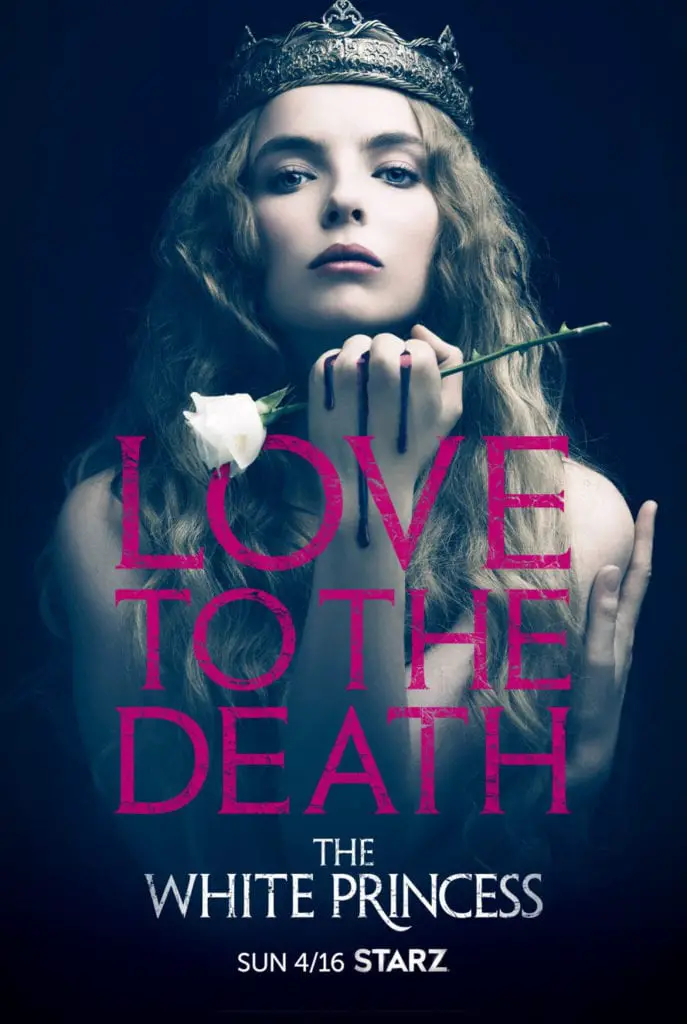
But first I’m going to be a completely honest.
Historical Disclaimers
My time in the History fandom (yes there is one) had led me to believe that the griefs that one might have with the shows depended on whose side one was on. If you are a pro-Lancastrians or a pro-York it is entirely possible you will scream for different reasons. And yes, in the English-speaking population there are still Lancastrian and York fan-boys.
Fortunately, for the intellectual honesty of this piece, in your faithful servant’s eyes one English noble is like any other English noble, even if they favor red over white and vice versa. I might have a tiny bias toward the Lancastrians, because Marguerite d’Anjou used to lead this faction, but at this point in history I am very much neutral. So let’s get down to business.
Costumes
What’s tolerable?
The costume are not historical. They never tried to hide that, since they sort of show the worst piece in their promo pictures. And I understand how it can bother costumes fans. Some costume are ugly even to an untrained eyes (Lizzie’s American football-looking blue and gold dress, for example). However, they are very rarely universe-breaking for a costume profane like myself. They even have some pretty nice in-universe explanations in term of symbolism, like Princess Cecily noting that the Tudors might think the red on Lizzie’s wedding dress was a mark of respect for them. And they are never, even near the level of blatant anachronism Reign attains.
In addition to that, even if sometimes they look weird, in-universe what Lizzie, Henry, and their court wear might effectively look like what Kings, Queens, and powerful noble would wear in other regards. There are dark, powerful colors here. They have jewels, which are coherent during the entire show without thinking the audience is stupid (Elizabeth Woodville’s ring being on Lizzie’s finger after her death). Also when there is fur, it actually looks like fur and not like this horrible ermine Elizabeth Woodville wore in The White Queen.
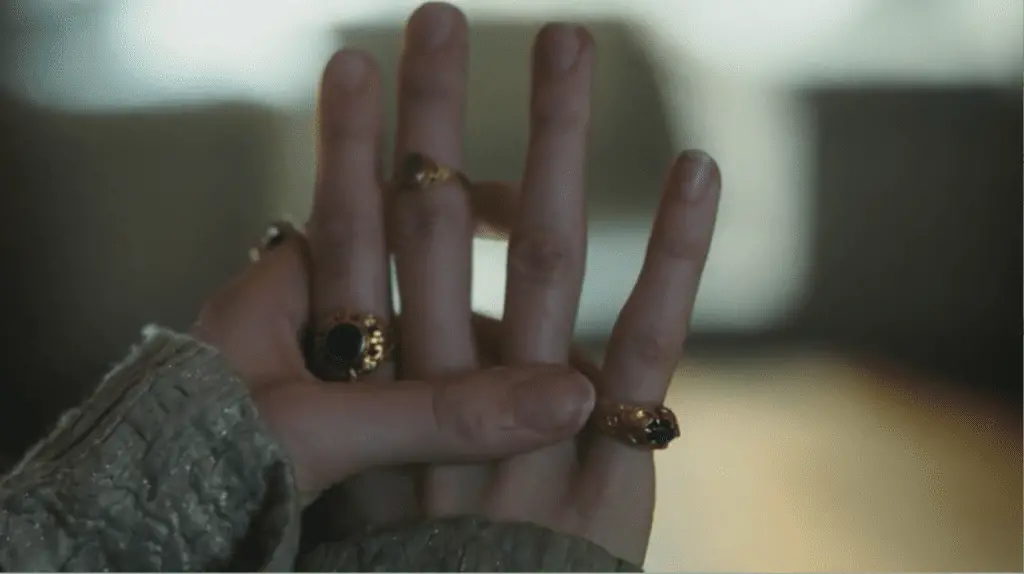
I also have the impression that the costume department made an effort to cut the dresses to avoid having the actors always lift their skirt in order to walk. It’s still in there sometimes, but once again less noticeable that it was in The White Queen.
Conclusion, too many costumes are not pretty, at least for me, in addition to not being historical. However, the whole thing looks coherent and never breaks the suspension of disbelief so it is tolerable.
The ugly hidden behind it
What really bothers me with The White Princess’s costumes it what they say about the story.
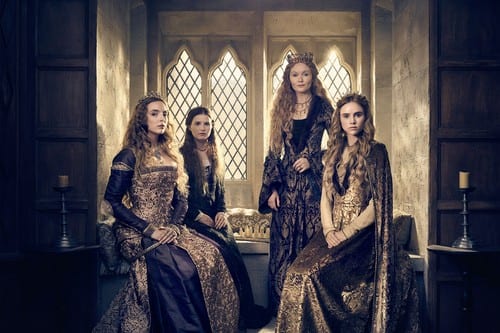
This are the York women. Notice something? They all have their hair down. And it’s not just for promotional purposes. All the women on the York side tend to do so (Cathy Gordon, Marie de Bourgogne) with the noticeable exception of Margaret of York. In contrast, the women on the Tudor side wear their hair up in a very strict fashion. Lizzie and Maggie start wearing their hair up when they ‘enlist’ with the Tudors. Now, wearing you hair loose if you are woman in the XVth century England is not allowed. Except if you are the queen and on very special occasions. So here we are facing a blatant anachronism. What does it mean?
To a modern audience, loose hair might inspire thoughts of liberty and modernity. So what The White Princess is trying to tell us is that the York dynasty is much more open and less strict than the Tudors, those terrible oppressors of woman-kind. And here begins the obvious pro-York bias that a show about the birth of the Tudor dynasty has. And when I say obvious, I mean both painfully obvious, like the Yorks wearing lighter, richer color than the Tudors, and quite simply, painful.
The Political Context
This is what the show runner, Emma Frost, has to say about The White Princess,
“This is much deeper psychologically. There is more time and space to dig into character. The politics in this really do matter and add more complexity to the intrigues and people.” (Source, emphasis mine)
This is great because I love historical political drama. There were some genuinely good things in this show at the beginning. It asked the question, how should a monarch act to be loved? In answer, it showed us nobles in favor of a certain side, having names and plans. Unfortunately it didn’t last more than 3 episodes. You know what, I am going to re-watch Elizabeth: The Golden Age.
But before I do that, we are here to have a look of what the show changed in terms of the politics.
What is tolerable?
The narrative invented a trip to Spain in which Lizzie and Henry meet Isabella and Ferdinand. This didn’t happen. The first English monarch to set foot in Spain was Victoria. But I am not completely against it. It offered a nice change from the monotonous English architecture, and it gave Lizzie something to do and a bit more agency.
The show also downplayed the role of nearly everyone in Europe. Scotland barely exists. France is nowhere to be seen. The point is probably to make Burgundy looks more omnipotent that it was to heighten the drama and tension. It creates a tragedy centered more around a family drama like those of Shakespeare. However…
The ugly hidden behind it
Compared to what Frost said, the political intrigues in The White Princess are simplistic. They downplayed the political context in Europe to such an extant that it actually makes their main characters, Lizzie and Henry, look like complete idiots. Hear me out, nearly ten years into his reign Henry VII hasn’t thought of creating any alliance in Europe. England is completely isolated and therefore seems weak when Burgundy presents Perkin Warbeck as a pretender with all of Europe except Spain recognizing him.
In real life, Henry VII didn’t forget that there was a thing called Europe in the South of England. Charles VIII, the King of France, at first gave shelter to Warbeck before realizing it would break his agreement of non-aggression with Henry VII, something he would not want to do. He then proceeded to kick Warbeck out of his court. It’s an example of course, but real life Henry would hit show Henry on the head for being so stupid.
In addition, English lords are always betraying Henry but it has no impact on the viewer since we don’t know who is who. We can’t care about the intrigues if we don’t even know who is doing what or why it matters. Long story short The White Princess is not the political drama we were promised. It’s a glorified family drama in the long tradition of soap operas.
And finally the unforgivable, the portrayal of Spain. Who agreed to this? It’s atrocious. Of course it takes place in a Moorish Palace. Of course everyone has dark hair and dark skin. Of course Isabella is covered from head to toe (because they are ‘extremist’ Catholics and it is known that Catholics are significantly ‘less fun’ than Protestants when the time comes to party). Of course she is an old, ugly, jerk of a character. Of course Ferdinand is transparent. Of course everyone is dancing flamenco.
Dear writing team for The White Princess, I am ready to exchange your book of Spanish stereotypes for one copy of Spain for Dummies.
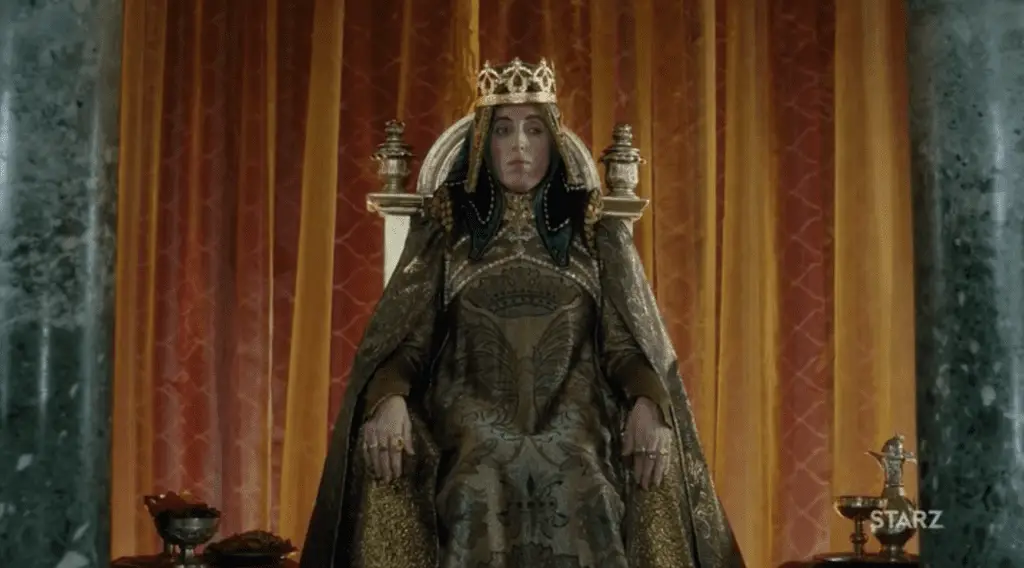
Perkin Warbeck
What is tolerable?
So…they decided to make Perkin the actual Richard of York, or at least a believable pretender (I haven’t watched the last episode yet so I can’t tell for sure). This is false, for sure, but I understand why. They wanted things to be harder for Lizzie. Moral dilemma! Did she choose the right side? Will she forever live in the shadows of her dynasty? I can’t stand the suspense!
Unfortunately…
The ugly hidden behind it
This character was written to be sympathetic to the audience, most likely to increase our empathy for Lizzie. However, I only know he is supposed to be sympathetic because the script is screaming at me. Like Henry says “people smile at him”, “he looks like a king”. And yes Perkin is polite and nice to most people he meets. But this is not enough for a modern audience.
Perkin wants to become King of England because it is his birthright, nothing more. He has never ruled over anything. He has no greater plan for England. He has lost every battle he fought in. His claim would bring England back into a civil war. It will also put his wife and son, that he says he loves, in danger. It will also dethrone his sister and put his nephews in harms way.
Because even if he claims he will not hurt them, the York dynasty doesn’t exactly have the best record for taking care of vulnerable pretenders and kinslaying. Edward IV condemned his own brother to death, murdered the mentally-ill Henry VI. The teenager Edward of Westminster was beheaded by order of the Duke of Clarence after a battle without any trial or ceremony. At the very least Richard III declared his own nephews bastard and imprisoned them in the Tower (he didn’t murdered them in-universe, though).
Knowing that, I understand why Lizzie might be more worried for her children than for the man who might be her brother. And I don’t understand how the creator of the series might have thought that a 21st century audience will find strength or reason in Perkin’s claim.
I am not a 15th century noble woman, birthright and blond hair don’t work on me. You are not sympathetic Perkin. You are an entitled teenager.
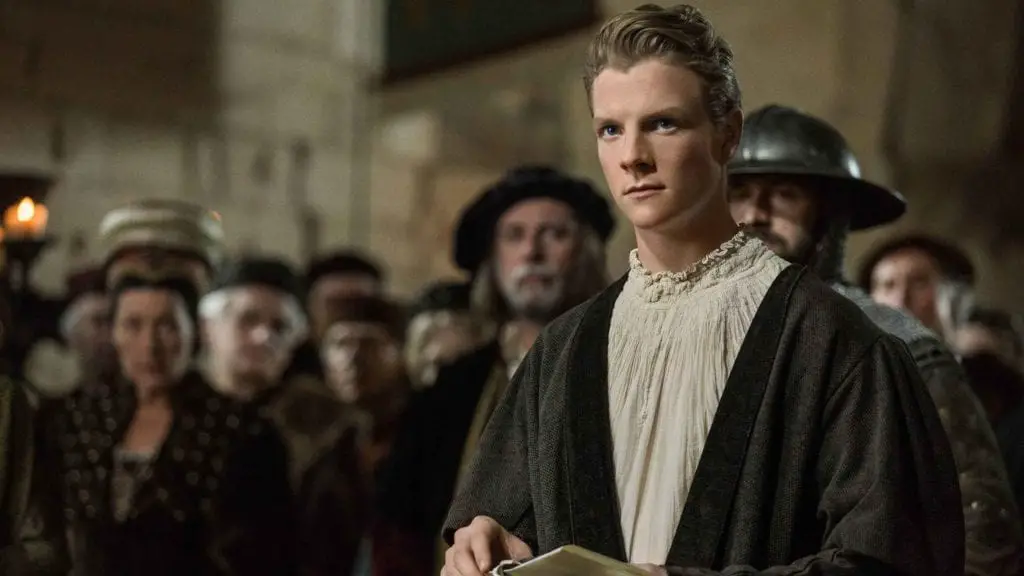
The White Princess is not Feminist
Okay, what is feminism first of all? Because I think the people behind this show need a reminder:
The advocacy of women’s rights on the grounds of the equality of the sexes. – Oxford Dictionary
So feminism is a political movement. How does one make a cultural product political in this way? To my mind, there are two methods of passing on a political message in a cultural production.
- You create the cultural production only to pass the political message (Victor Hugo’s poem Aux morts du 4 décembre ‘to the dead of December the 4th’ against Napoleon III)
- You create the cultural production because you want to tell this story which include a political message (X-men)
Obviously The White Princess falls in the second category. Then, in that case how do you write a feminist period drama? Again, I see two primary options.
- You write a historically accurate period drama that you center around women to remind the audience that modern feminism had not invented women. (realism)
- You write a historically inaccurate period drama that you center around women and give them thoughts and agency that are anachronistic for the time period. (escapism)
Which of the two possibilities did The White Princess chose? The third one!
- You try to mix both of the possibilities above, end up stumbling on your own dress, and falling head first into cat fights.
Yeah that’s bad. Let’s have a look at the three most important female characters to show were things went very wrong.
Lizzie
Our titular White Princess. She starts the show madly in love with her uncle who publicly declared her a bastard (yikes). She is forced to marry a man she despises, but not until after he raped her (this is still rape in the show) to be sure of her fertility (super yikes). Come on pseudo-feminist show writers, are you sure you want to work with Philippa Gregory’s story?
Even if we forget about the pilot and let pass her various contradictory characterizations, Lizzie is not a bad character. She is pro-active, cares for her children, loves her family. She cares about her royal duty and feels others people pain. Is she written as a feminist character though? No.
Her relationship with Henry
If we forget the pilot, her relationship with Henry started well. These are two people whose parents ambitions have put them in a situation they didn’t ask for but in which they have responsibility and they want to do well. It’s a fairly well done hate to love relationship (again, only if we exclude the pilot). They bond over their shared responsibility, loneliness, and love for their children. Both of the actors sell that pretty well.
However, even if we exclude the rape, their relationship is not healthy. She only has Henry and her children. Every time she tries to have a relationship with someone else, he criticizes her.

On top of that she has no ambition and no interest, outside of her husband and children. That’s not bad in itself; even more home and family oriented women can be feminists. However, for a supposedly feminist show, a woman whose entire life revolves around her husband and children is rather an odd choice of a lead. Even odder when you add in how she interacts with the other female characters.
Her relationship with other women
When I say that Lizzie is alone I don’t exaggerate. She starts the show as the favorite child of her mother, but their relationship quickly deteriorate and they become rivals. Her and her sister Cecily have a kind of sibling rivalry but they end up sort of bonding. I had a minute of hope, when Cecily comforted her sister over their mother’s behavior after Maggie’s wedding. I thought, “yes the sisters will bond over creating a better future for themselves.” But no. Cecily goes to live with her husband, and she is never seen again because I can’t have ONE NICE THING.
Lizzie and Maggie are also good friends at the start. But with time and the reappearance of Richard of York, Maggie starts to be more afraid of Lizzie than anything else.
That’s it. That’s what happens to all of Lizzie’s positive relationship with other female characters. She has no female friends. She has a fleet of maids of honor, but none of them is named, and she doesn’t seems to share a friendly relationship with any of them.
Lizzie is alone, has no positive female interactions, and no ambition of her own. Her husband isolates her from everyone and her only strong relationships are with him and her children. In what world is this a feminist heroine?
Elizabeth Woodville
The characterization of Elizabeth Woodville is what makes me question to what extent they thought of The White Princess as the sequel to The White Queen. In The White Princess, she is a deeply unpleasant character. Sure to be in the right, she will hurt anyone who might prevent her from achieving her goal. What is her goal though? Well, to put her favorite child on the throne of course, her favorite child being her son. Because nothing screams feminism as much as a mother thinking that her son’s birthright is more important than her daughters’ lives and futures.
Indeed Elizabeth wants to actively take back everything she forced Lizzie to have. She prevented her from aborting Arthur in order to make her Queen? Silly girl, of course it wasn’t for you. I just wanted you to keep your brother’s throne warm for him. So now move along. Oh and by the way your son is gonna die.
My god. I don’t think female characters should be flawless, but here we have an anti-feminist character who is somehow supported by the narrative. This is what Elizabeth Woodville says to her own GRANDSON’s ennoblement.
Any noble here should follow Prince Richard! The Duke of York! Instead of this Pretender.
Thanks grannie, I guess.
You might tell me that Elizabeth is the villain, but come on! One of the things I like about The White Princess is that they tried to not create a VillainTM. We are supposed to root for Lizzie yes, but understand that the people she is against are not bad guys.
So no, Elizabeth is not supposed to be a bad person. Even the narrative told us that we are supposed to think of her as a grand moral authority. When Maggie, definitively a good person, witnesses Lizzie’s mistreatment of Cathy Gordon, she tells Lizzie,
Your mother would be ashamed of you!
Why???????????? Elizabeth would dethrone her own daughter and grandchildren for the sake of her son. To give you a point of comparison, this is how the character of Clytemnestra thinks of her own daughter, who she wants to get rid of because she is afraid of her,
For her, the woman is worth as much as the man, because she is a woman; the womb [is worth] as much as the strain, because she has a womb; she never thinks one moment to destroy this daughter, with a womb, to save this son, with a strain, and she keeps Electra. — Electra by Jean Giraudoux (Ugly translation by me)
You know what the difference is? One character (Clytemnestra) was written by a man (Jean Giraudoux), who never said he was a feminist, in 1937. The other character (Elizabeth Woodeville) was written by a room full of women who claim to be feminists, in 2017. Guess which one is closer to an actual feminist character?
Yeah, I am pissed.
Margaret Beaufort
If there is one woman around Henry VII that you can easily turn into a feminist character, it’s Margaret Beaufort. She was proactive all her life, had a rich inner-life, and had political influence until her death. Guess which character has been eviled up for The White Princess? Margaret Beaufort of course, the evil religious fanatic!
So in Philippa Gregory’s world, Margaret Beaufort killed the Princes in the Tower and… wait, why are you adapting this book again?

Margaret is an adversary. She is presented as an overly devoted, barely fertile (because nothing screams feminism as much as pre-1950 misogyny), hypocritical, and a dispenser of poor-advice to her son. She has one or two moments to shine but always in a darker tone than every other female character. Basically, she is portrayed as the character you don’t want to be (she murdered the love of her life for Christ’s sake!), and she also tends to be humiliated by the narrative.
Long story short, it’s a study in character assassination. Turning the highly educated and courageous (also a survivor of child abuse) 15th century woman into a bitter, sterile, zealot, murderer is shameful. Especially for a “feminist” show.
Catholic Digression
I put this here because it is so linked to Margaret’s character that it had to be addressed. Even if everyone is religious (and ‘Catholic’ even if the term is anachronistic) in The White Princess, the only characters for whom religion is a significant part of their characterization are bad people.
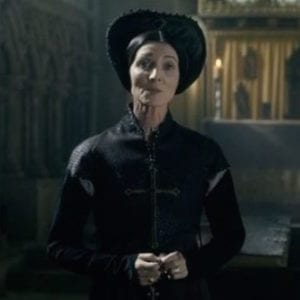
The Cardinal is a bad advisor and refuses to help the poor and sick. Every time he gives advice to someone he ends it with “Give all your money to the Church,” Trust me, Catholics also advise prayer and other stuff (fasting for example) for the sake of your soul. But even the money thing is completely out of touch with the reality of 15th century England. Yes, there were abuses, but most of the time, money that went to religious institutions was put to use in the community in positive ways. Yet, when Margaret goes on pilgrimage with Prince Henry, we’re meant to see the money she gives to monasteries as a bad thing! This is absurd. Among other things, monasteries took care of poor people, copied books, preserved knowledge, and helped to develop economic communities!
How can you present a portrayal of a religion, a still existing religion I might add, in such a caricatural, negative, and anachronistic way!? Catholicism is not the worst thing that happened to medieval Europe. Someone can be a hypocrite without being Catholic. Someone can be a good person and be a Catholic. Religious devotion does not make one a terrible person.
Put simply, the Borgias, a show about a pope the current Catholic Church is ashamed of, has more Catholic positivity than The White Princess.
Of course, the religious caricature makes Margaret Beaufort look worse. Not only is she bad, but she justifies every terrible thing she does with “God’s will” so she doesn’t feel responsible. I’ll leave aside that this is an anachronistic idiom (the modern concept of “God’s will” didn’t exist back then). In terms of the historical Margaret, the fact that the Catholic faith might have helped her after she birthed her sons at 14 (meaning her husband bedded her when she was 13) is not addressed at all. Something good coming from the Catholics? Not on this show!
There’s no nuance here. No respect either. Bad period drama! Bad!
Conclusion
I could have talked about the other female characters, but it wouldn’t have changed a lot. The White Princess is faux-feminism at its finest. It gave me an incredible desire to punch every member of the team who claims to have written a feminist show.
It is not a good period drama either. Actually, it isn’t even a very good show. The whole thing might have been more tolerable if it hadn’t been sold as it was. But no, it had to be marketed as a ‘deal-breaker for television’. Well it’s a waste of money and a waste of talent (there so many wonderful actors on it that it makes me sad). I watched it with a weird fascination and also because it stimulated my curiosity to read about the era, but my brain wasn’t completely solicited by the exercise.
If you have a low tolerance for mediocrity, or are real fan of the period do not watch this show. You are going to be pissed. Otherwise, might I suggest you have some wine to go with this low-brainer? Something salty maybe?


